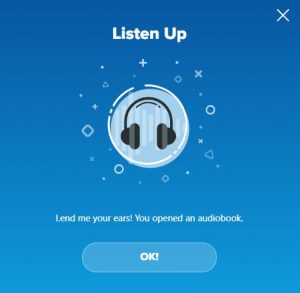
Your Brain on Audiobooks: Why Listening Matters
By: Annie Suhy, Outreach Specialist.
Before we are able to read, our parents read to us. We follow the story with our ears and the colorful illustrations spark our imaginations. Many have memories of parents, grandparents, siblings, or teachers reading to them as young children. Although I’ve never actually read The BFG by Roald Dahl with my own eyes, I can see the bone-crunching giant carrying little Sophie on his narrow shoulders, feel the warmth and worn comfort of my twin bed, and hear the funny voices of each character as my dad reads aloud. We consume books in this way until we are able to read on our own. But why stop listening? The exposure to language, vocabulary, and storytelling is vital to our learning at a young age, but those brain benefits associated with listening don’t end when we learn to read.
Studies show that these two different experiences, reading and listening, are strikingly similar cognitive processes. Some believe they obtain information more effectively from reading rather than listening, but as it turns out, it may just boil down to preference. According to University of Virginia Psychology Professor Dan Willingham, those who prefer reading may simply prefer the feel of a physical book over the spoken kind. The act of reading can carry pleasant associations, like curling up under the covers, but there is no innate talent for processing one format over the other.
Audiobooks for struggling readers
 For struggling readers, this is good news. One of the most cited studies published in the Journal of Educational Psychology reported that there was virtually no difference in overall comprehension when a story was either listened to or read. Keeping up with classmates in terms of grade-level content knowledge is vital for students when it comes to self-esteem and maintaining class participation.
For struggling readers, this is good news. One of the most cited studies published in the Journal of Educational Psychology reported that there was virtually no difference in overall comprehension when a story was either listened to or read. Keeping up with classmates in terms of grade-level content knowledge is vital for students when it comes to self-esteem and maintaining class participation.
But we do tend to consume audiobooks in much different settings than we do books, which can impact comprehension. While reading, we’re often in a quiet environment with our total focus on the book in our hands. While listening, we are more likely to be in the car, doing chores, exercising, or working. Multitasking is one of the main reasons why many seek audiobooks, but listeners may attribute their lack of concentration to the audiobook format itself instead of their busy environment. Classrooms can encourage full engagement by hosting listening centers in addition to reading areas so that students can immerse themselves in an audiobook, just as they might a traditional book.
The science of listening
Another study published in the Journal of Verbal Learning and Verbal Behavior suggests that our brains may actually be able to create more imagery surrounding a story when we listen. The visual processing centers in our brain are at work taking in the written word as we read, which leaves less room for images. But when listening, the images come practically unbidden. Beginning readers naturally concentrate on processing the words as they learn to read, and therefore may not be able to give their full attention to the actual story they’re reading. Offering a chance to sometimes listen can help keep kids’ imaginations active, expose them to a broader vocabulary before they encounter the words on the page, and continue to foster a love of books and a motivation to read.
Audiobooks for everyone
As audiobooks continue to rise in popularity, schools can utilize the format as a way to reach ESL students, struggling readers, reluctant readers, beginning readers, those with learning disabilities, and more. Educators can use audiobooks as another tool to enhance learning rather than as a replacement for the written word. There are many different ways to experience stories—and research suggests none better than the other. Some even argue that listening to a writer read their story is actually a book in its truest form. As author Neil Gaiman expressed, “You’re down there in the words, unable to skip a dull-looking wodge of prose, unable to speed up or slow down…less able to go back. It’s you and the story, the way the author meant it.”
Browse blog and media articles
Public Library Training
K-12 Library Training